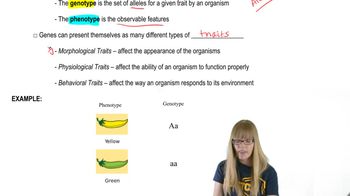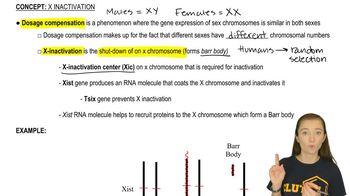Table of contents
- 1. Introduction to Genetics51m
- 2. Mendel's Laws of Inheritance3h 37m
- 3. Extensions to Mendelian Inheritance2h 41m
- 4. Genetic Mapping and Linkage2h 28m
- 5. Genetics of Bacteria and Viruses1h 21m
- 6. Chromosomal Variation1h 48m
- 7. DNA and Chromosome Structure56m
- 8. DNA Replication1h 10m
- 9. Mitosis and Meiosis1h 34m
- 10. Transcription1h 0m
- 11. Translation58m
- 12. Gene Regulation in Prokaryotes1h 19m
- 13. Gene Regulation in Eukaryotes44m
- 14. Genetic Control of Development44m
- 15. Genomes and Genomics1h 50m
- 16. Transposable Elements47m
- 17. Mutation, Repair, and Recombination1h 6m
- 18. Molecular Genetic Tools19m
- 19. Cancer Genetics29m
- 20. Quantitative Genetics1h 26m
- 21. Population Genetics50m
- 22. Evolutionary Genetics29m
2. Mendel's Laws of Inheritance
Sex-Linked Genes
Problem 24c
Textbook Question
In humans, the ABO blood type is under the control of autosomal multiple alleles. Color blindness is a recessive X-linked trait. If two parents who are both type A and have normal vision produce a son who is color-blind and is type O, what is the probability that their next child will be a female who has normal vision and is type O?
 Verified step by step guidance
Verified step by step guidance1
Identify the genotypes of the parents for both traits. Since both parents are type A, they could be either homozygous (IAIA) or heterozygous (IAi) for the ABO blood type. For normal vision, they must have at least one normal vision allele (XNXn or XNXN).
Determine the possible genotypes of the son. Since the son is type O, he must have inherited the 'i' allele from both parents, indicating both parents are heterozygous (IAi). For color blindness, the son must have inherited the X-linked recessive allele (Xn) from his mother, indicating she is a carrier (XNXn).
Calculate the probability of the next child being type O. Since both parents are IAi, the probability of having a child with type O blood (ii) is 1/4.
Calculate the probability of the next child being female and having normal vision. The probability of having a female child is 1/2. The probability of a female child having normal vision (XNXN or XNXn) is 3/4, since the mother is a carrier (XNXn) and the father has normal vision (XNY).
Combine the probabilities. Multiply the probability of the child being type O (1/4) by the probability of being female (1/2) and having normal vision (3/4) to find the overall probability.
Recommended similar problem, with video answer:
 Verified Solution
Verified SolutionThis video solution was recommended by our tutors as helpful for the problem above
Video duration:
1mPlay a video:
Was this helpful?
Key Concepts
Here are the essential concepts you must grasp in order to answer the question correctly.
ABO Blood Type Genetics
The ABO blood type system is determined by multiple alleles (IA, IB, and i) at a single locus on an autosome. Individuals can have blood types A, B, AB, or O depending on the combination of alleles inherited from their parents. Type O results from the presence of two i alleles, while type A can arise from either IAIA or IAi genotypes.
Recommended video:
Guided course

Descriptive Genetics
X-linked Inheritance
X-linked traits are associated with genes located on the X chromosome. In humans, males have one X and one Y chromosome, while females have two X chromosomes. Color blindness is a recessive trait linked to the X chromosome, meaning that males only need one copy of the allele to express the trait, while females need two copies.
Recommended video:
Guided course

X-Inactivation
Punnett Squares and Probability
Punnett squares are tools used to predict the genetic outcomes of offspring based on the alleles of the parents. By determining the possible combinations of alleles from each parent, one can calculate the probabilities of various traits in the offspring. This method is essential for understanding inheritance patterns, especially in cases involving multiple alleles and X-linked traits.
Recommended video:
Guided course

Probability

 7:56m
7:56mWatch next
Master Sex-Linked Genes with a bite sized video explanation from Kylia Goodner
Start learningRelated Videos
Related Practice



